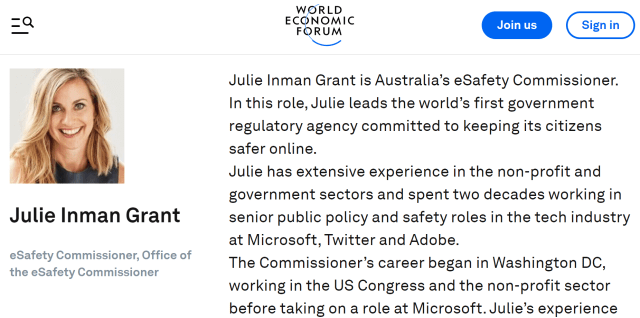Australia's Orwellian Named eSafety Commissioner will force Big Tech to Scan photos, emails
From TOTT News
Australia's eSafety Commissioner, who is a regular at the World Economic Forum's annual Davos event, will enforce her powers to develop mandatory online scanning standards for tech companies.
Tech giants will be forced to scan emails, online photo libraries, cloud storage accounts, and dating sites of Aussies for “illegal content”, or face fines of nearly $700,000 per day.
Australia’s eSafety Commissioner, Julie Inman Grant, has announced the draconian move after rejecting two proposed industry codes as “inadequate”.
Under two mandatory standards aimed at child safety released by the regulator last year, Grant proposed that providers should “detect and remove” “child-abuse material” and “pro-terror material” “where technically feasible” – as well as “disrupt and deter new material of that nature”.
Developed by key service providers and delivered to eSafety in February for review, the problematic proposed Designated Internet Service (DIS) and Relevant Electronic Services (RES) codes are just two of eight sectoral guidelines established after the passage of the Online Safety Act 2021.
Despite making “significant amendments” following her September demands and feedback to the February drafts, eSafety Commissioner Julie Inman Grant said the revised draft DIS and RES guidelines – two of eight codes set to be finalised – “still don’t meet our minimum expectations”.
‘Shortfalls’, she explained, include the failure of the DIS to “…detect and flag known child sexual abuse material” in file and photo storage services, as well as the failure of RES providers to detect and flag “horrendous” material in email and partially encrypted messaging services.
Now that tech companies have failed to meet the requirements of the Act, Inman Grant will exercise her powers under section D145(1)(a)(ii) of the Act – which empowers her to “determine a standard” if a draft code “does not contain appropriate community safeguards”.
That will see her office develop standards for DIS and RES service providers that will be mandatory and enforceable – with eSafety able to investigate and impose injunctions, enforceable undertakings, and financial penalties of nearly $700,000 per day.
Five other codes – covering social media services, Internet carriage services, app distribution services, hosting services, and equipment codes – were accepted and will take effect soon.
Apple has warned the proposal to force tech companies to scan cloud and messaging services for child-abuse material risks “…undermining fundamental privacy and security protections” and “…could lead to mass surveillance with worldwide repercussions“.
By drawing a new line on CSAM filtering – and forcing Apple, Google, Microsoft, Meta, Twitter and others to toe it – eSafety risks rekindling a vitriolic international privacy and civil rights debate.
Increasing government scrutiny of their operations may, if past experiences are any indication, see these companies restrict Australians’ access to core services in the name of user privacy.
“While we don’t take this decision lightly, we feel that moving to industry standards is the right one to protect the Australian community.”
I’m sure Julie Inman Grant ‘thought long and hard’ about this one.
Indeed, she thought of how much of a good time she had at Davos 2023 and 2024, and how the puppet master behind the scenes really want more censorship of the internet.
The World Economic Forum describe her as an “agenda shifter”, as she was planted from the United States and Bill Gates’ Microsoft with the direct intention of steering online thought policing.
Julie looks to seal the gates on a mass surveillance agenda that has grown extensively since 9/11, and was accelerated by the COVID-19 ‘pandemic’. All for our ‘safety and security’, of course.
How much longer will a free internet survive in Australia?
THE END OF PRIVACY
It has been a methodical, incremental move to this point.
For the last two years, the government has been working to replace the existing patchwork of surveillance laws in what it has described as the “…most significant reform to Australia’s national security laws in more than four decades”.
The proposal was out in a discussion paper entitled ‘Reform of Australia’s Electronic Surveillance Framework’, published by the Department of Home Affairs.
In addition, let’s not forget that an international coalition of over 60 nation states, including Australia, launched A Declaration for the Future of the Internet to ‘fight disinformation’.
In 2018, the government passed anti-encryption legislation that compels companies to grant authorities access to encrypted information, in a move that already has had vast implications for digital privacy.
Now, they want live-time scanning and reporting.
Microsoft, who Julie started with, announced in October that it will expand its ‘support’ for national cyber security systems and cloud computing services across Australia, with a $5 billion investment.
At TOTT News, we have been warning against mass surveillance in Australia for over a decade. Check out this piece from back in 2014 where we detailed some of the imposing threats.
Since then, the physical world has become imposed with a plethora of monitoring apparatuses, including biometric analysis, ‘anti-terror’ legislation, and more. And now, they move to the online realm.
We should all keep an eye on this move by the bought-and-paid-for eSafety Commissioner.
With the defeat of the misinformation bill, it seems this is just another way to force it through.
Just like they did when facial recognition legislation was rejected, only to come back as Digital ID.
Big Brother is Watching, ladies and gentlemen.










